10 Form Drills You Should Always Do Before Workouts
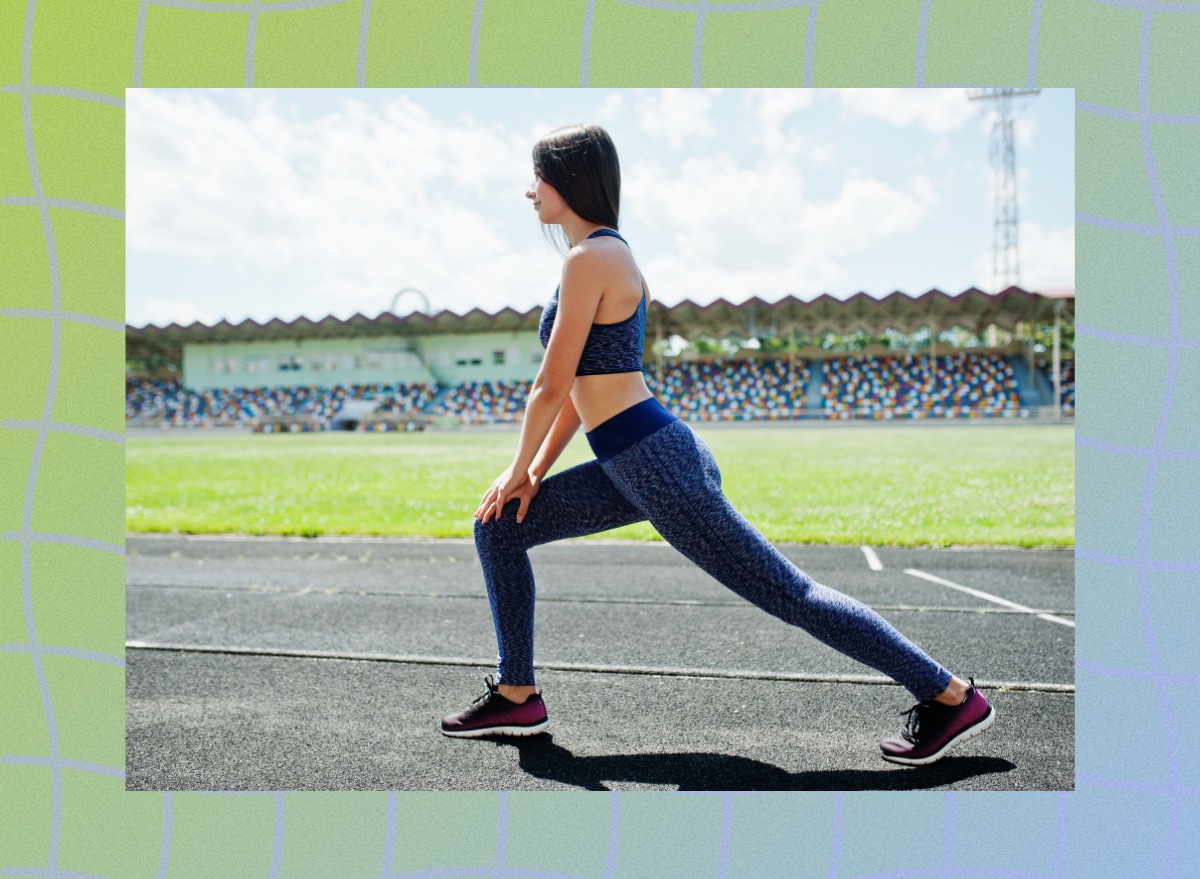
Listen up, fitness enthusiasts. Today, we're diving into a crucial aspect of your training: form drills. These drills are the secret sauce that can take your workout from good to great, helping you maximize efficiency, prevent injuries, and enhance performance. Whether you're gearing up for a cardio session, hitting the weights, or preparing for a run, form drills are essentially your pre-game warm-up MVPs. They prime your muscles and fine-tune your movement patterns, setting the stage for a killer workout ahead.
Form drills aren't just about going through the motions; they're about activating the right muscles, improving your range of motion, and getting your mind and body in sync. So, before you jump straight into heavy lifts or sprint intervals, take a few minutes to incorporate the below form drills into your routine.
This guide lists the top 10 form drills you should integrate into your pre-workout routine. Each drill serves a specific purpose, from enhancing flexibility to improving balance and coordination. Get ready to level up your fitness game and unlock new levels of strength and agility. Now, let's dive into these form drills!
High Knees
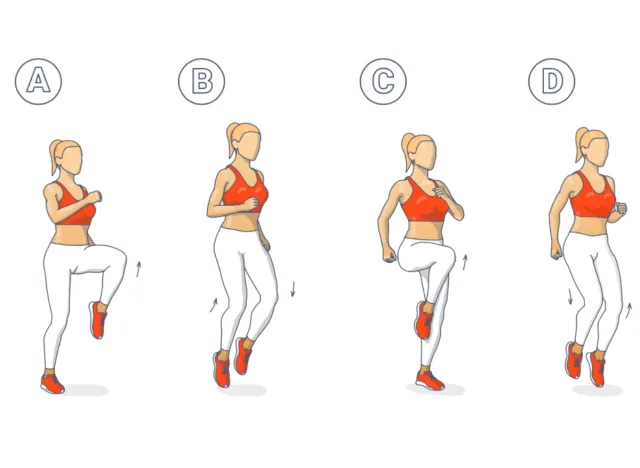
High knees are one of the best form drills you can do. They provide a dynamic warm-up that increases the heart rate, improves coordination, and enhances lower-body flexibility. This drill prepares your body for explosive movements like sprints and plyometrics, activating the hip flexors, quadriceps, and calves.
Start standing with your feet hip-width apart. Lift one knee toward your chest while driving the opposite arm up. Alternate quickly between your legs, keeping your core engaged and maintaining a brisk pace. Aim to bring your knees to at least hip level with each lift.
Perform for two to three of 15 to 30 seconds as part of your warm-up routine.
Lunge with Rotation
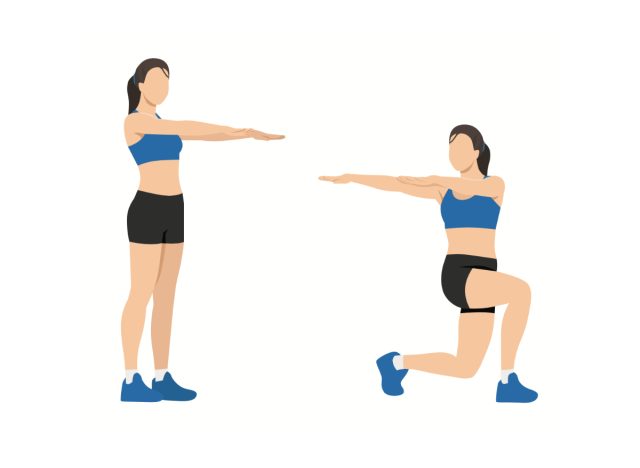
The lunge with rotation combines lower-body strength with core stability and flexibility. This drill improves hip mobility, strengthens the quadriceps, hamstrings, and glutes, and enhances rotational flexibility in the spine. It prepares your body for activities that involve twisting motions, such as golf swings and tennis serves, and everyday movements, like picking up objects from the ground.
Start by standing tall with your feet hip-width apart. Take a large step forward with your right foot, bending your right knee to lower into a lunge position. Keep your left leg straight behind you, balancing on the ball of your foot. Place your hands together in front of your chest or extended ahead of you, or clasp them behind your head. Rotate your torso to the right, twisting from your waist and bringing your right elbow toward your right knee. Hold the position briefly, then rotate back to the center. Push off your right foot to return to the starting position, then repeat on the left side.
Perform two rounds of 10 to 12 lunges with rotation on each side, focusing on maintaining proper form and breathing throughout the movement.
Leg Swings
Leg swings dynamically stretch the hamstrings, hip flexors, and adductors, improving hip mobility and flexibility. This drill is beneficial before lower-body workouts like squats, lunges, and running, as it helps to loosen tight muscles and increase the range of motion. Leg swings activate the stabilizing muscles around the hips, enhancing balance and coordination.
Stand next to a wall or sturdy object for support. Swing one leg forward and backward in a controlled motion, keeping the leg straight but not locked. Swing through a comfortable range of motion, gradually increasing the height of the swing as your muscles warm up.
Complete two rounds of 10 to 15 swings on each leg, then switch sides. Throughout the exercise, focus on maintaining good posture and engaging your core.
Yoga Pushup
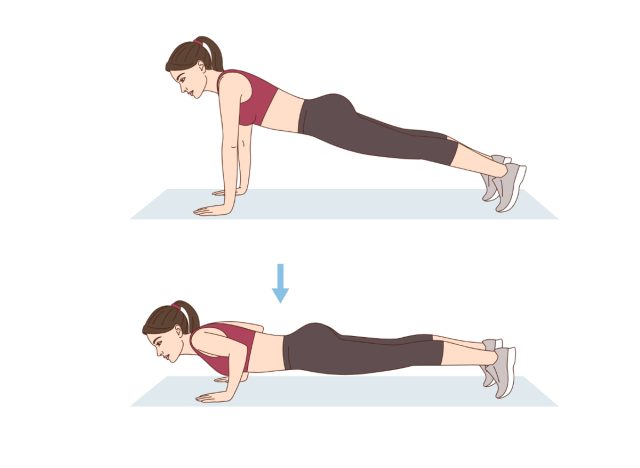
The yoga pushup is effective for building upper-body strength, especially in the chest, shoulders, and triceps. This drill improves core stability and enhances overall body control by requiring controlled movement through a full range of motion. It prepares your upper body for pushups, bench press variations, and overhead presses, promoting muscle endurance and functional strength.
Start in a high plank position with your hands directly under your shoulders and your body forming a straight line from your head to your heels. Engage your core and lower your chest toward the ground by bending your elbows close to your body. Keep your elbows tucked in and your forearms vertical throughout the movement. Lower until your elbows are at a 90-degree angle or slightly below, then push back up to the starting position by straightening your arms. Ensure your body remains straight throughout the exercise, avoiding sagging or lifting the hips.
Aim for two sets of eight to 12 repetitions, focusing on maintaining proper form and breathing rhythmically.
Deep Squat with Hamstring Stretch
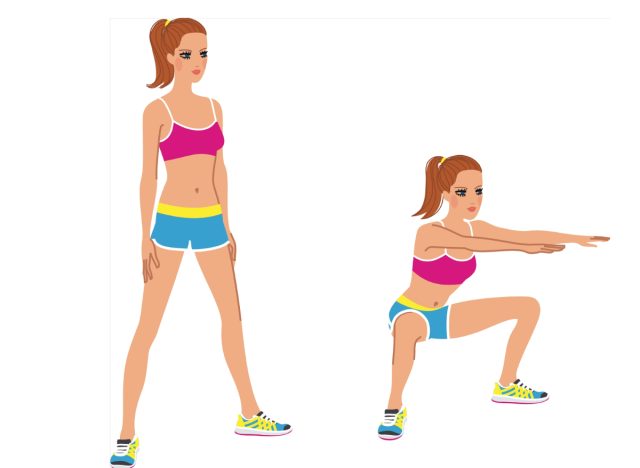
The deep squat with hamstring stretch combines lower-body strength and flexibility, targeting the quadriceps, hamstrings, glutes, and calves. This drill improves hip mobility and ankle flexibility while stretching the hamstrings, preparing your body for squats, deadlifts, and lunges. It enhances lower-body range of motion and helps to prevent injuries by warming up the muscles and joints.
Start by standing tall with your feet slightly wider than hip-width apart. Lower your body into a deep squat position by bending your knees and pushing your hips back, keeping your chest lifted and your weight in your heels. Place your hands together before your chest or extend them straight out for balance. Hold the deep squat for a few seconds, then straighten your legs slightly as you lift your hips toward the ceiling, extending your legs and keeping them as straight as possible.
Feel the stretch in your hamstrings as you hinge forward at the hips. Hold the stretch for 10 to 15 seconds, then return to the deep squat position and repeat the movement for eight to 10 repetitions. Focus on maintaining proper form and breathing deeply throughout the exercise.
Lateral Lunges
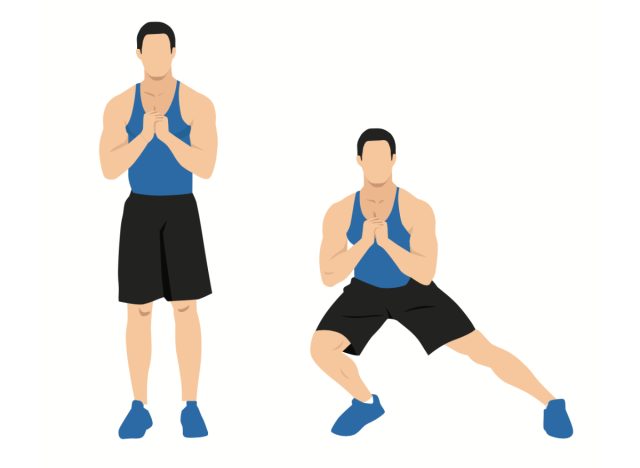
Lateral lunges target the adductors, abductors, and glutes, improving hip flexibility and strengthening the inner and outer thighs. This drill prepares your legs for lateral movements. It helps to stabilize the knees and hips, reducing the risk of injury during activities that involve side-to-side motion, such as skating or agility drills.
Start standing tall with your feet together. Take a wide step to the right, keeping your left leg straight and bending your right knee to lower into a lunge position. Keep your chest lifted and your weight in your heels. Push off your right foot to return to the starting position, then repeat on the left side.
Perform 10 to 12 lunges on each side, maintaining proper form and keeping your knees aligned with your toes throughout the movement.
Carioca Drill
Carioca drill improves agility, coordination, and hip mobility by engaging the lower-body muscles in a dynamic lateral movement pattern. This drill is particularly beneficial for athletes involved in sports that require rapid direction changes, such as soccer, basketball, or tennis.
Start by standing with your feet together and knees slightly bent. Step sideways with your right foot behind your left foot, then bring your left foot out to the side. Cross your right foot in front of your left foot, then step out with your left foot to complete one cycle. Repeat this side-to-side stepping motion, gradually increasing speed as you become more comfortable with the movement.
Complete 10 to 12 reps per side, maintaining a smooth and controlled rhythm.
Hip Circles
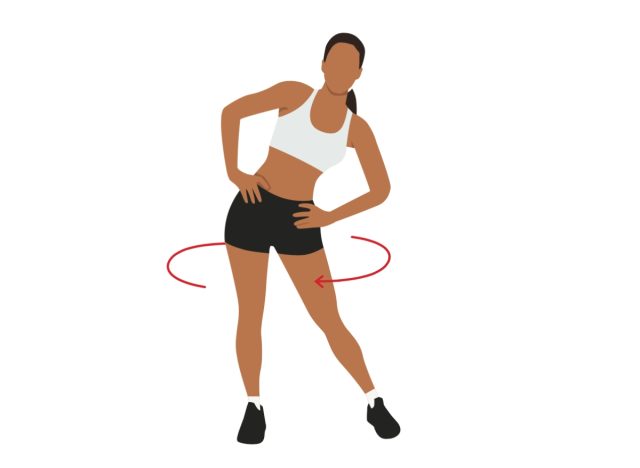
Hip circles improve hip mobility and warm up the hip joints, which is crucial for activities like squats, lunges, and running. This drill also engages the core muscles to stabilize the pelvis and lower back, enhancing overall posture and alignment during workouts.
Stand tall with your feet hip-width apart. Place your hands on your hips for support. Start by making circular motions with your hips, rotating them clockwise for 10 to 15 repetitions. Then, reverse the direction and rotate your hips counterclockwise for another 10 to 15 repetitions. Focus on using your hips to draw large, controlled circles while keeping your upper body stable. This movement should feel smooth and fluid, helping to loosen up the hip joints and surrounding muscles.
Ankle Bounces (POGOs)
Ankle bounces activate the calves and ankles, improving ankle stability and preparing the lower body for explosive jumps and sprints. This drill enhances proprioception and coordination, which are essential for maintaining balance and agility during dynamic exercises.
Stand tall with your feet hip-width apart and knees slightly bent. Rise onto the balls of your feet, lifting your heels off the ground. Begin bouncing lightly on the balls of your feet, keeping your movements quick and controlled. Maintain a steady rhythm and aim for 10 to 20 seconds of continuous bouncing. Focus on landing softly and using your ankles to absorb the impact of each bounce. This exercise should feel challenging but manageable, helping warm the calves and improving ankle mobility.
Inchworms
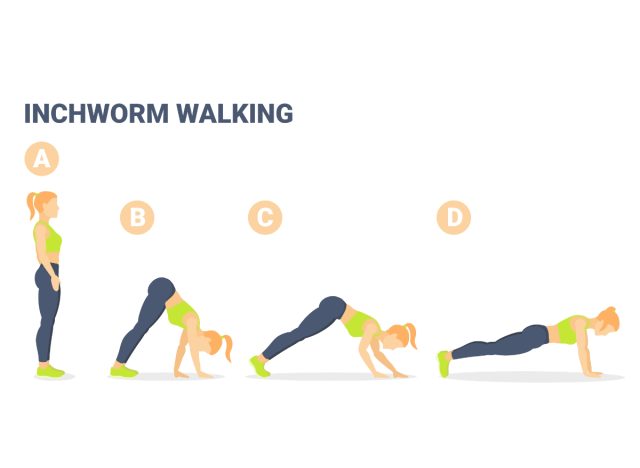
Inchworms dynamically stretch the hamstrings, activate the core muscles, and improve shoulder stability and mobility. This drill prepares your body for upper and lower-body strength exercises, such as pushups, planks, and burpees. Inchworms also promote full-body coordination and help to improve overall flexibility.
Start standing tall with your feet hip-width apart. Bend forward at the hips and place your hands on the ground before you. Walk your hands forward until you reach a high plank position, keeping your core engaged and your body in a straight line from head to heels. Pause briefly, then slowly walk your feet toward your hands, keeping your legs straight but not locked. Return to the starting position by standing up tall. Perform two sets of eight to 10 repetitions, maintaining a smooth and controlled motion throughout the exercise.









